Demita Pinchback grabbed onto the future. In her case, it was a steering wheel, one that belonged to a zero-emission electronic vehicle at Mutual Housing at Sky Park. In a few seconds, she would hum the Chevy Volt out of the parking lot on a test drive. In a few years, the hope is that hundreds, if not thousands, of low-income drivers like herself will follow the same path.
“It makes me feel good,” Demita said, “that I’m using a new vehicle and (creating) less pollution.” When it comes to doing something to stem and possibly reverse the environmentally devastating impacts of climate change, Demita smiled when she said, “I’m a part of it!”
Late in January, Mutual Housing California introduced the electronic vehicles to the 80 apartment homes that it owns and manages at Sky Park. Earlier in the month, Mutual Housing – in collaboration with the Sacramento Air Quality Management District, the California Air Resources Board, Breathe California, and the Zipcar car-share company – brought the EV experience into its River Garden community. Later in the year, it intends to expand the program to Mutual Housing on the Greenway. Already, the car share program had been up and running, with hugely successful results, at Mutual Housing at Lemon Hill.
The January rollout was part of a state-funded program that is providing zero-emission vehicles to low-income people throughout Sacramento. Besides fulfilling a crucial short-term transportation need for the economically disadvantaged, the EV campaign also is designed to let the wider community know that when it comes to getting serious about climate change, everybody can do something, regardless of how much money they make, or don’t make.
“Our residents, on average, earn less than $28,000 a year per household,” Mutual Housing Asset Manager Bryan Dove said. “It’s a segment of the population that typically doesn’t have access to electric vehicles, and we’re giving them the opportunity to use electric vehicles free of charge – to run errands, to take their kids to school, to go to work for short periods of time, and to save the environment and reduce air pollution in the local neighborhood.”
And that is not a misprint. The car share program is free to all Mutual Housing residents, as long as they’re 21 years old, hold a valid driver’s license, join the car share community, and are reachable by email.
“This technology is going to be the future,” said James Collins, the EV program manager for Breathe California. “We need to be sure that we are providing this opportunity to everybody, and at a cost that is in line with what they can afford. In this case, since they are low-income or from a disadvantaged community, it makes sense to offer it for free, so we can integrate these vehicles into a network, into the future. They are already ahead of the curve.”
The California Air Resources Board is paying for the program with “cap-and-trade” funds. This is the multi-billion-dollar money stream state government officials created in 2006 from financial penalties imposed on industrial polluters who do not meet their annual emission-reduction goals. Participants in the program, such as Mutual Housing California, have been required to provide a 25 percent cash or in-kind contribution, to help defray the costs of EV infrastructure necessities such as charging stations.
Locally, the Sacramento Metropolitan Air Quality Management District administers what is officially known as Our Community CarShare Sacramento Program. Air quality officials allocated $1.3 million in May 2017 for the first phase of the program that put eight zero-emission vehicles on the street at four sites, including two cars at Mutual Housing at Lemon Hill. The $1 million second phase of the program began early this year, with six electric vehicles designated for the Mutual Housing communities at Sky Park, River Garden and the Greenway. A third phase is scheduled for later this year, at sites to be determined. Sac Metro Air District officials said the $2 million third phase will double the size of the program.
“We’re trying to provide people with zero-emission mobility options, and we’re doing that by deploying to subsidized housing communities, so we’re working with the housing agencies at select sites to provide this free access for residents to use the vehicles for short trips,” said Steffani Charkiewicz, an air quality engineer with the district. “We want to get mobility to all who need it, so we’re going to continue to expand this program as long as the funding is available.”
As far as Lemon Hill is concerned, the car share program has been a smashing success. According to Bryan Dove, some 26 residents at the south Sacramento community have signed up to drive. By late last year, they were putting in about 200 trips a month for around 3,000 emission-less miles.
“I drive it to work and shopping,” Mutual Housing at Lemon Hill resident and car sharer Jiali Wu told a recent conference on the EV program held in the Lemon Hill community room. “(My family) retired one of our gas cars. It is saving me almost $25-30 a month in gas.”
Besides the Sac Metro Air District program, Mutual Housing California also is partnering with other organizations to expand the EV car share concept to two of its communities in Davis. The programs at the Owendale and Moore Village communities will be operated in conjunction with Greenlots, the Los Angeles-based firm that is working with cities and utilities to try and ramp up worldwide EV infrastructure on a major scale. Late last month, Greenlots was acquired as a wholly-owned subsidiary of the Shell oil company. Meanwhile, Greenlots recently signed on to deliver the operating platform for Electrify America’s $2 billion plan to establish a national network of EV platforms, of which the Davis car share programs will be a part.
As the EV network builds out across the continent, one of these years, you might see Demita Pinchback pulling into a charging station in an electronic vehicle like the one she signed up to drive out of Mutual Housing at Sky Park.
“This car is very important to me,” Demita said. “I feel relieved that it’s here, that I’m guaranteed to get my kids back and forth to school with no problems, no worries.”
And no fumes for the sky.






Why would 14 electric vehicles cost 2.3 million dollars?